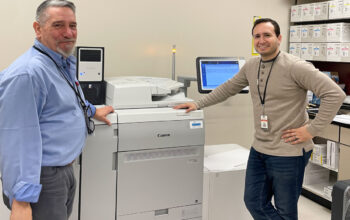Kay Timmis, substitute teacher, is one of these international jetsetters. Travelling to a wide variety of places, from Namibia to Sicily, Ms. Timmis has taken countless trips and experienced many cultures.“I especially like going places where there is still some of the old culture left.” Ms. Timmis said. “Things are changing so rapidly, it’s important to appreciate the history of a country as well as enjoy its modern features.”
Ms. Timmis particularly enjoyed visiting Namibia, a country in Southern Africa, where the past is reflected in the present. “The diversity of the tribal peoples was very intriguing; they put a paste made from red ochre in their hair and on their bodies, something that they have been doing since the Neolithic era,” she explained.
Ms. McLellan is another teacher who has had the pleasure of traveling the world. Ms. McLellan, in fact, has visited all 7 continents, including countries such as: Antarctica, Egypt, China, Mongolia, Australia, Argentina, and many places in Europe.
Clare McLellan, a science teacher here, also enjoys keeping things simple, as shown by her cruise in Antarctica. “It was a wonderful place. I loved the penguins, the wildlife. There were no people around, no sense of civilization. It was cool to be somewhere that was so natural,” she said.
Both teachers have had their faire share of worldly experiences. “In Mongolia, I saw the beautiful Buddhist monuments. One night I went up to the lake region and had a bonfire, all of the travelers and guides and locals in the circle singing. It was wonderful camaraderie,” shared Ms. Timmis.
Similarly, Ms. McLellan has very positive memories of the people she encountered through her travels. “I’ve never been anywhere where I felt in danger. Everyone was always friendly to me, and the natives seemed very welcoming,” she said.
However, as many travelers do, both Ms. Timmis and Ms. McLellan faced the occasional challenge of overcoming the cultural gaps in the places they’ve visited.On Namibia, Ms. Timmis said, “On the last day there was something called a “Sing-Sing”, where all the tribes dressed in costumes to dance and were judged. It was hard because you didn’t feel that they liked you being there – you felt that you were not welcome, and they were performing out of obligation. It didn’t feel like a joyous sharing of their culture.”
Ms. McLellan agreed, saying she was hesitant on immersing herself in her surroundings. “It was hard because of my shy personality. I didn’t want to speak the languages in fear of embarrassing myself. Like when I went to France, I had some high school French knowledge in my back pocket – but I wasn’t confident enough to use it with the locals,” she said.
During her travels, Ms. Timmis gained a new perspective on society outside of the classroom. “I like learning how people live, and what their values are. You try to read ahead and understand your surroundings with what little time you have. It makes me sad to see people in wars; everyone has this mindset of we vs they,” she said.
Although it was hard at times to overcome such differences, both teachers agree that their travels directly translate to their careers at the high school.Ms. McLellan shared, “It’s affected my teachings here directly. I have taught both Marine Biology and Environmental Science, and I dedicated an entire unit to the Antarctic food chain. It turned out to be a really great project.”
Ms. Timmis thought differently of how her experiences affect her role here at the school. “I wish kids realized that they’re so well provided here. The students should be more engaged; they have this opportunity to succeed, and many students don’t take advantage of it,” she said. “They don’t realize that some places in the world, ones I’ve seen firsthand, are in shortages of everything that we take for granted; books, desks, even teachers.”
Ms. McLellan also had a similar idea, on the positive impact of her travels in her teaching. “It’s always beneficial, especially for students, to experience different kinds of people. It’s important for teachers to realize that everybody’s an individual, and that every kid who comes into the classroom needs respect. That’s the only way to run a responsible classroom.”
Both Ms. Timmis and Ms. McLellan emphasized a token of knowledge that they acquired through their travels. Ms. McLellan said, “So many of the students here in New Canaan have the wonderful opportunity to travel. Everyone should realize that they’re lucky to be able to take such trips. I had these great experiences, and it has definitely affected who I am today.”
Ms. Timmis agreed, saying, “It’s the great secret of the universe that everyone’s connected – everything is important. Through my travels it’s become clear to me that no matter where you are we are all connected.”
However, Ms. McLellan and Ms. Timmis aren’t the only globetrotting teachers at this school; Dr. Schneider has been to over 40 countries and Mr. Stevenson has visited a wide variety of countries including France, Cambodia, Syria and Cyprus.




